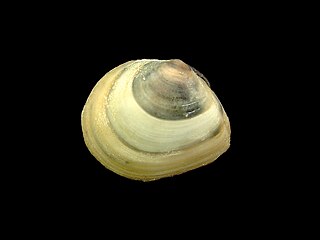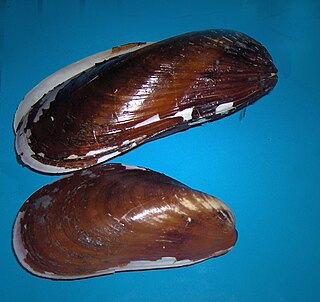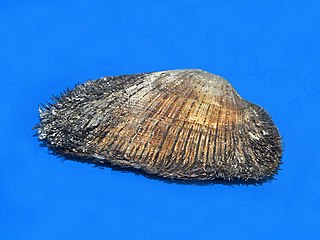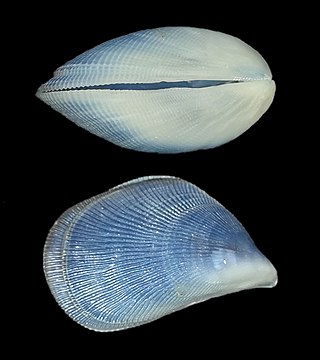
Scrobicularia plana, the peppery furrow shell, is a bivalve mollusc belonging to the family Semelidae.

Limecola balthica, commonly called the Baltic macoma, Baltic clam or Baltic tellin, is a small saltwater clam, a marine bivalve mollusk in the family Tellinidae.

The common cockle is a species of edible saltwater clam, a marine bivalve mollusc in the family Cardiidae, the cockles. It is found in waters off Europe, from Iceland in the north, south into waters off western Africa as far south as Senegal. The ribbed oval shells can reach 6 centimetres (2.4 in) across and are white, yellowish or brown in colour. The common cockle is harvested commercially and eaten in much of its range.
The pod razor is a coastal bivalve of European waters. It is edible and has been fished commercially, especially in Portugal, Spain, Ireland and Scotland.

Perna perna, the brown mussel, is an economically important mussel, a bivalve mollusc belonging to the family Mytilidae. It is harvested as a food source but is also known to harbor toxins and cause damage to marine structures. It is native to the waters of Africa, Europe, and South America and was introduced in the waters of North America.

Mya truncata, common name the blunt gaper or truncate softshell, is a species of edible saltwater clam, a marine bivalve mollusk in the family Myidae.

Modiolus modiolus, common name northern horsemussel, is a species of marine bivalve mollusk in the family Mytilidae.

The Mediterranean mussel is a species of bivalve, a marine mollusc in the family Mytilidae. It is an invasive species in many parts of the world, and also an object of aquaculture.

Ensis ensis, or the sword razor, is a razor clam, a marine bivalve mollusc in the family Pharidae. It lives buried in the sand and is found off the coasts of northwest Europe.

Tellina tenuis, the thin tellin, is a species of marine bivalve mollusc in the family Tellinidae. It is found off the coasts of northwest Europe and in the Mediterranean Sea, where it lives buried in sandy sediments.

Lutraria is a genus of medium-sized marine bivalve mollusks or clams, commonly known as otter shells.

Lutraria lutraria is a species of large marine bivalve mollusc in the family Mactridae. Its common names include the otter shell and the common otter shell. It occurs in coastal regions of the north east Atlantic Ocean where it lives buried in the sand.

Venerupis corrugata, the pullet carpet shell, is a species of bivalve mollusc in the family Veneridae. It is found buried in the sediment on the sea bed in shallow parts of the eastern Atlantic Ocean. It is harvested for human consumption in Spain and other parts of Western Europe.

Cerastoderma glaucum, the lagoon cockle, is a species of saltwater clam, a marine bivalve mollusc in the family Cardiidae, the cockles.

Glossus humanus, the oxheart clam, is a species of species of marine clam found in deepwater off the Atlantic coastline of Europe and Northern Africa. It is the only remaining extant species in the genus Glossus.

Dinocardium is a genus of large saltwater clams or cockles, marine bivalve molluscs in the family Cardiidae, the cockles. There is only one species in the genus, Dinocardium robustum, or the Atlantic giant cockle.

Barbatia barbata is a species of ark clam, a marine bivalve mollusk in the family Arcidae, the ark clams.

Pteria penguin, commonly known as the penguin's wing oyster, is a species of marine bivalve mollusk in the family Pteriidae, the pearl oysters. It is native to the western and central Indo-Pacific region and is used for the production of cultured pearls. The generic name comes from Greek πτερον (pteron) meaning wing.

Septifer bilocularis is a marine bivalve species in the family Mytilidae, the mussels.




















